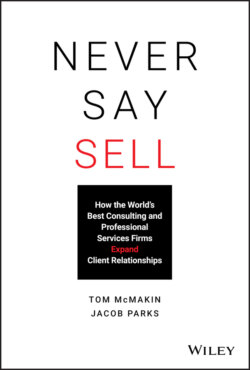Читать книгу Never Say Sell - Tom McMakin - Страница 16
A Word about Words
ОглавлениеWalt Shill is the head of business development for the worldwide environmental and sustainability consulting firm, ERM. Previously, he managed the North American strategy practice for Accenture, and before that was a partner at McKinsey. Early in our process of writing this book, Jacob asked him, “How are expert services sold?” Walt was spending his Saturday afternoon relaxing in his flower garden at his home in Reston, Virginia.
“Jacob,” he said, “never say sell. Consulting isn't sold. We're trusted advisors to our clients.”
Walt explained that, as expert services providers, we're there to be of assistance as our clients work to achieve their business goals.
Scott Wallace, an attorney at Perkins Coie, agrees: “We never talk about sales at the firm. I don't think I have ever heard the words ‘make a sale,’ or ‘sales.’ You do hear the term ‘business development,’ but not ‘sales.’”
Expert service providers don't sell. We work with people to solve problems.
We like words, so one of our first questions was, “Is ‘business development’ a euphemism for ‘sales,’ propagated by white-shoe consultants afraid of being lumped in with car salespeople? Or is it something different?”
We think the two terms are different. The definition of sales, to our mind, is the act of exchanging goods based on an agreed-upon price. Salespeople thrive in the world of transactions. After all, when we purchase a computer, a car, or a house, we are measuring the merits and relative comparisons on fixed attributes. A satisfying transaction can include transparency and civility, but it is not contingent on trust or long-term relationships. “Salespeople” often carry a negative association because they're thought of as those who jump at the chance to take advantage of information asymmetries. The car salesperson knows what they bought the car for and where there are opportunities to upsell you after the sale on extended warranties, low APR loans with high fees, and undercarriage protection. The buyer does not.
By contrast, we think business development is about establishing relationships and listening to clients. It is contingent upon a baseline of trust and credibility, both of which grow as you consistently deliver good work and add value in collaboration.
Economists talk about expert services as being a “credence good.” Credence comes from the Latin word, credere, which means “to give trust to.” A client gives you their trust before they engage with you. Why? Because you know more than they do.
When we hire a cybersecurity firm to protect us from intrusion, their experts know more about cyber-threats and defenses than we ever will. That puts them in a position of power in their relationship with us: They are both diagnosing the problem and making recommendations. Once they peek under the hood of our network, a cyber protection firm might say, we will need to erect a cloud-based firewall monitored by a 24/7 operations desk. Alternatively, they may simply say Windows Defender is fine. We wouldn't know the difference.
That's one of the signal differences concerning goods that are sold on features and attributes like Tom's family's computer and expert services. With goods, we can diagnose the problem. The old laptop is slow, has no battery life left, and weighs more than a three-year-old. When cash loosens up, Tom and Mary decide they need to fix that problem. But with expert services, it's different: We need to trust the provider to tell us the truth about the problem and then right-size a solution.
And so, goods are sold, but expert services are not. With goods, it's helpful to have someone (the salesperson) explain the features and attributes and make comparative claims against the competition. With services, the secret is not in telling but rather in listening. Only by listening do we uncover opportunities where our skills and the trust we have built with clients align and produce mutual opportunity.
